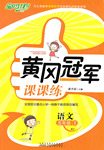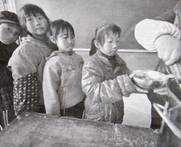题目内容
One day a man found a cocoon(茧)of a butterfly in the forest. He sat there for several hours and watched the butterfly. Suddenly a small opening appeared, and the butterfly made its great effort to force its body through that little hole. Then it seemed to stop making any progress. It appeared as if it had gotten as far as it could and it could go no further.
So the man decided to help the butterfly. He cut off the remaining bit of the cocoon so that the butterfly could come out easily. But to his surprise, the butterfly got a heavy body and very small wings when it came out of the cocoon.
The man continued to watch the butterfly because he expected that the body would grow smaller at any moment and the wings would become larger and be able to fly. But neither happened! In fact, the butterfly spent the rest of its life crawling(爬) around with a heavy body and small wings. It was never able to fly.
The man was in his kindness, but he did not understand the nature rules. Before the butterfly came out of the cocoon, fluid (流体) from its body must be forced into its wings, and then it would be ready for flying. It must have a hard struggle(拼搏)to get through the small opening to get its freedom from the cocoon.
Sometimes struggles are exactly what we need in our life. If God allowed us to go through our life without any difficulties, it would make us fail. We would not be as strong as we could have been; we could never fly.
【小题1】what was the butterfly doing at the beginning of the story?
| A.It was trying to make a cocoon for itself. |
| B.It was struggling to get out of its cocoon. |
| C.It was flying among the trees in the forest. |
| D.It was crawling around quietly on the ground. |
| A.to take the butterfly home |
| B.to help the butterfly come out easily |
| C.to kill the butterfly |
| D.to stop the butterfly growing bigger. |
| A.Patient but cruel. | B.Careful and wise. |
| C.Kind but unwise. | D.Brave and funny. |
| A.Struggles are sometimes necessary in our lift. |
| B.Nothing is difficult if we put our heart into it. |
| C.Every good deed will come back with good result. |
| D.The greatest happiness in the world is to help others. |
| A.The Love for the Cocoon. | B.The Joy of Helping Each Other |
| C.The Lesson of the Cocoon. | D.The Expectation for the Butterfly |
【小题1】B.
【小题2】B.
【小题3】C.
【小题4】A.
【小题5】C.
解析试题分析:这篇短文中好心的人帮助一只正在破茧的蝴蝶,结果最终却害了这只蝴蝶,从而昭示了一个深刻的人生哲理——有时候在我们的生活中努力奋斗正是我们所需要的。
【小题1】细节理解题 根据第一段Suddenly a small opening appeared, and the butterfly made its great effort to force its body through that little hole.描述,可知这只蝴蝶正努力从它的茧里面出来,故选B。
【小题2】细节理解题 根据第二段He cut off the remaining bit of the cocoon so that the butterfly could come out easily.描述,可知选B。
【小题3】细节理解题 根据第四段The man was in his kindness, but he did not understand the nature rules.及上下文描述,可知选C。
【小题4】细节理解题 根据最后一段Sometimes struggles are exactly what we need in our life.及下文描述,可知选A。
【小题5】推理判断题 这篇短文中好心的人帮助一只正在破茧的蝴蝶,结果最终却 害了这只蝴蝶,从而昭示了一个深刻的人生哲理。故选C,一只茧子的教训。
考点:人生百味类短文阅读。

 黄冈冠军课课练系列答案
黄冈冠军课课练系列答案When I was in the eighth grade, my teacher asked us to write an article about what we would like to do when we grew up. All I could think of was one sentence I want to help other people! During the years, I met many problems. But I never gave up. I know that to help other people I have to help myself first. I encouraged myself after I experienced failures(失败). Finally .my dream really came true. I found a part-time job in a charity. I began to spend my days doing things for people. I have a happy life. That doesn’t mean that this kind of life is easy, or that my work is always enjoyable. I an happy because I an doing what I want to do.
What do you want to do? Write it down now. If you don’t know, you can ask yourself, ”What would I do if this was the last day of my life ?” Then write down the first thing that comes to your mind, no matter(无论) how silly or impossible it is. If you have an answer, you will know what your dream is.
【小题1】The passage is developed by______.
| A.space | B.time | C.giving an example | D.giving reasons |
| A.having a good life | B.being a rich man |
| C.helping others | D.working for a charity |
| A.The writer never have experienced failures in his dream |
| B.The writer could encourage himself when he’s in trouble |
| C.Everyone could make his dream true if he has an idea |
| D.No one can make his dream true |
| A.to believe in our dreams and never give up |
| B.how to help people |
| C.how to have a happy and easy life |
| D.that it is good to help other people |
| A.Having a Dream | B.To Be with Your Dream |
| C.My Dream. | D.Making Your Dream True. |
People are always afraid of making mistakes. But sometimes it’s not bad to make mistakes, and here is why.
At first , mistakes are a clear sign that you are trying new things. It’s always good to new things, because when you are trying new things your are growing. If you never try new things , how can you improve ? How can you create? The simple answer is, “ You can’t .” Look around you, everything you see is the result of someone trying new things.
Another good thing about mistakes is this : when your are making mistakes, you are learning. Consider this: Edison failed 10,000 times before he invented the light bulb. When he was asked how he felt to fail that many times, but rather had learned 10,000 things that didn’t work.
Finally , when you make a mistake, you are that much closer to success. Why? Because you have said what you should say, and you have done what you should do. Every time you make a mistake, you are closer to success. But it doesn’t mean that you can make mistakes without thinking. Instead, when you try new things you have to think them over, so that you can keep away from some unnecessary mistakes.
We shouldn’t spend all our time and money on the only one way , but use them correctly. Because our time and money are limited. (有限的)
There is an old saying, “ If you are not making mistakes, you are not trying hard enough.” So go bravely and make mistakes. And learn. And grow. And succeed.
根据短文内容,选择正确答案,并将其字母代号填人题前括号内。(共5小题,每小题2分,满分10分)
【小题1】If you are making a mistake, that means____.
| A.you’re careful | B.you’re kind |
| C.you’re growing | D.you know nothing. |
| A.improve | B.create | C.spend | D.A and B |
| A.gave up | B.invented the light bulb |
| C.invented the computer | D.invented 10,000 new things |
| A.time | B.money | C.success | D.everything |
| A.Never make mistakes. |
| B.You can make mistakes without thinking |
| C.Sometimes it’s good to make mistakes. |
| D.Making mistakes is terrible |
阅读下面短文,从方框内选择恰当的句子填入文中空白处,使短文内容完整、意思连贯。
Tens of thousands of people of Hangzhou City, Zhejiang Province took part in the funeral(葬礼) of “the most beautiful driver” Wu Bin on June 4, 2012. 【小题1】
At noon on May 29, he drove the Zhejiang A19115 large bus from Wuxi back to Hangzhou, carrying 24 passengers. 【小题2】 It hit Wu in the abdomen(腹部). He looked very painful and put the right hand over the abdomen, then drove slowly down, stopped at the side of the road, playing two flashing lights to let other drivers be careful, and pulled a good handbrake(拉好手刹). At last he tried his best to stand up, turned to the frightened passengers and said: “ 【小题3】 ”
The passengers saw he couldn’t speak and blood kept running from his abdomen. At once they called the police. Wu Bin was later sent to Wuxi Liberation Army 101 Hospital. 【小题4】 But he saved 24 passengers’ lives on his bus.
【小题5】
| A. Don’t run, safety first. B. On the morning of June 1, Wu Bin died. C. Wu Bin made the greatest thing in the last minute. D. Many of them volunteered(自愿)to help to keep traffic orders. E. At about 11:40, a piece of iron suddenly dropped from the sky. |

Almost every Chinese person can recite the two lines of the famous poem, “Every grain on the plate comes from hard work(谁知盘中餐,粒粒皆辛苦).” But sadly, many of us don’t actually get the real meaning of these lines: Don’t waste food.
A CCTV program, News One Plus One, reported that the food Chinese people throw away every year is enough to feed 200 million people for a year.
Do we have too much food? Of course not. According to the UN World Food Program, there were 925 million hungry people around the world in 2010, especially in developing countries. Six million children die of hunger every year.
Chinese people are well known for being hospitable(好客的) and generous. Many even feel that they lose face if their guests have eaten all the food on the table.
Luckily, a number of people have realized the importance of saving food. Last November, Li Hong, a waitress in a restaurant in Nanjing, got fired because she took some leftover food home for her son. Many people stood by her side and criticized(批评) the waste of food.
What should we do in our daily lives to waste less food? Here are some tips:
1. Do not order too much in a restaurant. Only order as much as you want to eat. If you cannot eat all the food you ordered, take the rest of it home.
2. Don’t be too picky(挑剔的) about food. Some food may not taste great, but your body needs it.
3. Keep an eye on what food you have at home. Don’t buy too much, especially for vegetables and fruit.
【小题1】How many people were hungry in the world in 2010 according to the UN World Food Program?
| A.200 million. | B.Six million. | C.925 million. | D.625 million. |
| A.Many Chinese restaurants waste a large amount of food. |
| B.Many Chinese people are kind-hearted and ready to help the weak. |
| C.Chinese people feel that they lose face if their guests eat all the food. |
| D.Many Chinese people don’t agree with the behavior of wasting food. |
| A.过期的 | B.剩余的 | C.腐烂的 | D.难吃的 |
| A.food comes from very hard work |
| B.six million children die of hunger every day |
| C.there is enough food to feed all the people |
| D.Chinese are hospitable and generous |
| A.Ordering more than you need at a restaurant. |
| B.Taking home restaurant leftovers. |
| C.Not knowing what you already have at home when shopping. |
| D.Not eating the food you don’t like even if it’s healthy. |
